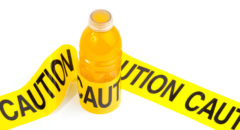
(BlackDoctor.org) -- Some children are always out of control. Sometimes it's naughty behavior, sometimes it's the result of poor parenting...but sometimes, out-of-control behavior is caused by a mental health disorder known as ADHD.
ADHD Symptoms
While bad behavior often accompanies other symptoms of ADHD, bad behavior in isolation is not ADHD. Children with ADHD simply cannot contain their impulses and active behavior like other kids, and these symptoms sometimes resemble bad behavior:
1. Inattention -- daydreaming, lack of organization, inability to start or stick with routine tasks
2. Impulsivity -- saying and doing things that are inappropriate (interrupting, being disruptive) on a regular basis
3. Hyperactivity -- fidgeting, needing to move around, talking excessively
Distinguishing ADHD from bad behavior can be difficult because not only do the symptoms resemble bad behavior, but they can also lead to bad behavior.
RELATED: Calm Parents Can Help Calm Kids With ADHD
Step Back and Observe
Begin by observing your child's behavior first. To tell the difference between bad behavior and ADHD, observe behavior over time and in different situations such as at home, at school, at a park, at the movies, and at the dinner table. If the behaviors persist over six months and across settings, it could be ADHD.
But it's important to note that there are 18 criteria for a professional ADHD diagnosis, and none of them are about bad behavior. The most common reason for bad behavior in school is a learning style mismatch between the teacher and the student.
Seventy percent of those labeled with ADHD are misdiagnosed. If your child is able to follow directions and stay on task at home, but not at school, then the issue is the school environment, not the child.
Misbehavior can look an awful lot like ADHD, and a great number of ADHD diagnoses are based on questioning parents and teachers. Children are over-diagnosed with a label of ADHD too often.
Be careful when observing very young children. It's difficult to determine if their behavior has an underlying cause, especially with a child under the age of 7. Very young children, particularly boys, have immature nervous systems and can often present as if they have ADHD.
Address the Behavior
ADHD is not an excuse for inappropriate behavior. You must establish firm boundaries while also showing understanding of your child's challenges. The issue isn't whether it's bad behavior or ADHD but rather how to teach your child to modify their inappropriate behavior. ADHD is a catchall diagnosis that is often contained within other issues. Teach your child to recognize unacceptable behavior and modify it.
RELATED: ADHD: Treating Your Child Without Medication
Consult a Professional
Not everyone who exhibits hyperactive, impulsive, or inattentive traits has ADHD, so how is a diagnosis made? It is important that a child receive a thorough examination and appropriate diagnosis by a qualified professional. Since ADHD has a strong genetic link and tends to run in families, the doctor will need the child’s complete medical history.
To rule out other medical problems, hearing and vision problems should also be considered, as they could contribute to similar behaviors.
If ADHD is suspected, a specialist should be consulted for a formal diagnosis. Developmental/behavioral pediatricians, clinical social workers, behavioral neurologists, child psychiatrists, and psychologists are qualified to diagnose ADHD.
These steps are recommended:
- Talk to your child’s pediatrician
- Make an appointment with a child psychiatrist to review specific ADHD symptoms
- Request a neuro-psychological evaluation (from school, a mental health clinic, or a private psychologist)
- A good evaluation will look not just at the possibility of ADHD but also at possible learning disabilities that may make a child’s behavior look like ADHD.









